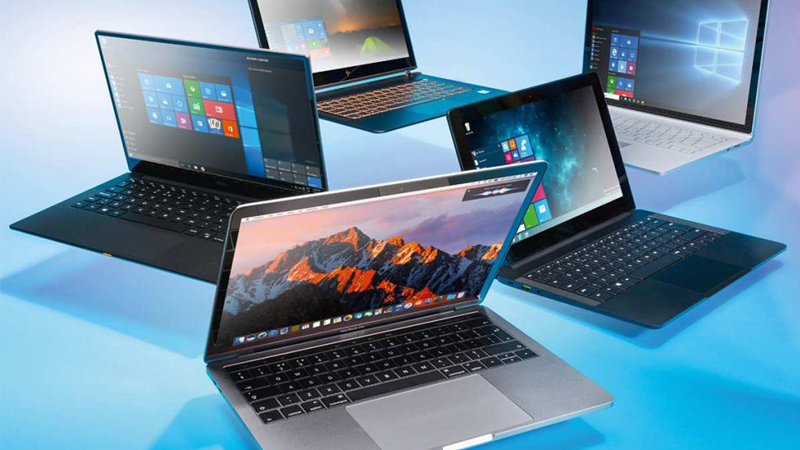Choosing a laptop involves considering various factors based on the user’s needs, preferences, and budget. How to Choose The Best Laptops? Here’s a guide to help you select the right laptop for different types of users:
1. Purpose of how to choose the Best Laptop:
Choosing the best laptop can be overwhelming, given the numerous options available on the market. The key to making the right decision lies in understanding your specific needs and matching them with the laptop’s features and capabilities. Here’s a guide on how to choose the best laptop for you.
- General Use (Web browsing, Office tasks, Media consumption):
- Traditional Laptop or Chromebook: Offers a good balance of performance and cost for everyday tasks.
- Look for at least 4-8GB RAM, Intel Core i3/i5 or AMD Ryzen 3/5, and 128-256GB SSD.
- Portability (Travel, Frequent mobility):
- Ultrabook or 2-in-1 Laptop: Lightweight, long battery life, and versatile.
- Look for 8GB RAM, Intel Core i5/i7 or AMD Ryzen 5/7, 256GB SSD, and battery life over 8 hours.
- Gaming:
- Gaming Laptop: High-performance with dedicated graphics.
- Look for at least 16GB RAM, Intel Core i7/i9 or AMD Ryzen 7/9, Nvidia GeForce GTX/RTX or AMD Radeon RX, and fast refresh rate displays.
- Professional Use (Graphic design, Video editing, Programming):
- Workstation or High-end Ultrabook: Powerful performance and professional-grade features.
- Look for 16-32GB RAM, Intel Core i7/i9 or AMD Ryzen 7/9, dedicated GPU, 512GB-1TB SSD, and high-resolution display.
- Business Use:
- Business Laptop: Robust security features, durability, and extended warranty.
- Look for 8-16GB RAM, Intel Core i5/i7 or AMD Ryzen 5/7, 256GB-512GB SSD, and enterprise-grade security features.
- Education (Students):
- Chromebook or Budget Laptop: Affordable, simple, and durable.
- Look for 4-8GB RAM, Intel Core i3 or AMD Ryzen 3, 64-128GB storage, and good battery life.
2. Specifications of how to choose the Best Laptop
- Processor (CPU): Determines overall performance.
- Intel Core i3/i5/i7 or AMD Ryzen 3/5/7 for general use.
- Intel Core i7/i9 or AMD Ryzen 7/9 for gaming and professional use.
- Memory (RAM): Affects multitasking capability.
- 4GB for basic tasks, 8GB for general use, 16GB for gaming and professional tasks, 32GB+ for heavy multitasking and demanding applications.
- Storage: Affects speed and storage capacity.
- SSD is preferred for speed (128GB for basic use, 256GB for general use, 512GB-1TB+ for gaming/professional use).
- HDD is larger and cheaper but slower.
- Graphics Card (GPU): Essential for gaming, graphic design, and video editing.
- Integrated graphics for basic tasks.
- Dedicated GPU (Nvidia or AMD) for gaming and professional use.
- Display: Affects visual experience.
- 1080p (Full HD) for general use.
- 1440p (QHD) or 4K (UHD) for professional use and high-end gaming.
- Higher refresh rates (120Hz, 144Hz) for gaming.
3. Build Quality and Design
- Material: Metal builds are more durable than plastic.
- Keyboard and Touchpad: Comfortable typing and responsive touchpad.
- Port Selection: Sufficient USB ports, HDMI, Thunderbolt, etc., based on needs.
4. Battery Life
- Long Battery Life: Important for portability; look for laptops with 8+ hours of battery life.
5. Brand and Warranty
- Brand Reputation: Consider reliability and customer service.
- Warranty: Look for at least a 1-year warranty, with extended options.
6. Budget
- Set a budget based on the required features and try to get the best specifications within that range.
7. Reviews and Recommendations
- Read Reviews: Check online reviews and user feedback.
- Seek Recommendations: Ask friends or colleagues who have similar usage requirements.
By carefully evaluating these factors, you can select a laptop that best fits the specific needs of the user.

